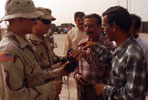Andrew Scutro to examine consequences of occupation on military personnel and Iraqis
The publisher and editor of Monterey County Coast Weekly sent their prized reporter Andrew Scutro off to his latest assignment on Dec. 15 with a helmet and body armor. To their knowledge, he’s the first alternative weekly reporter to go to Iraq.
Scutro, who’s 33, will spend three weeks in Iraq. Most of his time will be spent embedded with an Army Civil Affairs unit that is working with Iraqis to set up the equivalent of city councils, Johnson says. Scutro has also arranged to interview L. Paul Bremer, head of the Coalition Provisional Authority, and spend time in the Baghdad office of Occupation Watch, an organization sponsored by an international coalition of peace and justice groups that is monitoring the occupation’s military and economic impact on Iraq.
One of the things Scutro wants to discover is how well Americans and Iraqis interact and communicate. “Can these two groups of people — one that would rather be home and the other wanting these unwelcome visitors to leave — communicate successfully with one another?” Scutro wrote in a memo the week before he flew to Iraq.
The importance of the Defense Language Institute Foreign Language Center to communication efforts gives Scutro’s Iraq coverage a local angle. The center is in Monterey. In September, Scutro wrote about the institute’s Global War on Terror task force, which was set up to address language barriers between military personnel and residents of the regions where they search for terrorists.
Scutro pursued his assignment with tenacity. Last March, he wrote a story for Coast Weekly critical of the way the media was covering the war. But, he admitted in his article, he was breaking the “glass-houses rule,’ as no AAN member publications had journalists on the ground in the combat zone. “These newspapers cluck with glee at the failings of mainstream media but did not see the need to provide an ‘alternative’ perspective from the place where the bullets fly,” Scutro wrote.
“I said, “If you want to go, go,'” Editor Eric Johnson says. To arrange his trip, Scutro communicated with officials at the U.S. Army Garrison Presidio of Monterey, then the Department of Defense in Washington. He finally got a call through to U.S. Central Command. “He put one foot in front of the other for months, ” Johnson says.
Scutro expects to write several articles, including a cover story scheduled for Jan. 15. Johnson hopes to sell some of Scutro’s articles to other AAN papers to help defray the paper’s cost of sending Scutro to Iraq, which runs to several thousand dollars, and to provide additional compensation to the reporter. “He’s spending Christmas in a war zone,” Johnson says.
This is the second time Coast Weekly has sent a reporter to that part of the world, says publisher and executive editor Bradley Zeve. The first was in 1991, when then news editor Jim Cole went to the Persian Gulf on a military cargo plane. Coast Weekly is not one of the largest AAN papers—it has a circulation of 40,000—but Zeve says it has a strong commitment to covering hard news.
Zeve joked about becoming the proud owner of a Kevlar vest, which he might put to use at the next AAN convention. But he had more than that on his mind. “Hopefully, it will go well for him. I’m a little anxious, sending Andrew into a war zone.”

